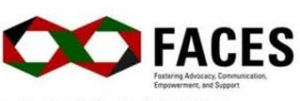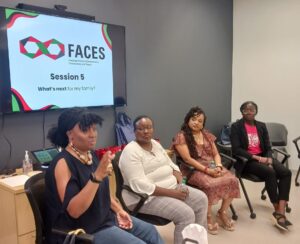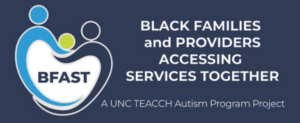February is Black History Month and the Autism Society of North Carolina (ASNC) is highlighting the autism journey experienced by Black individuals and families across our state. Data shows that Black children in North Carolina have a lesser chance of being properly diagnosed with autism, are not receiving proper interventions, and experience gaps in how their families are supported. ASNC continues to dedicate itself to ensuring that all families affected by autism are empowered to access the diagnoses, supports, and resources they need to thrive. That is why ASNC partnered with NC State University’s FACES for Autism and The University of North Carolina’s TEACCH Autism Program.
About FACES for Autism 
FACES, an acronym for Fostering Advocacy, Communication, Empowerment, and Support, has a mission to “inform and strengthen empowerment among Black families and caregivers of autistic children and adolescents by addressing inequities in access to support services.” (FACES for Autism) While working to improve the quality of life for Black autistic children and their families, FACES also advances the field of education with regard to culturally responsive special education practices and policies and contributes to autism research through teaching and learning from families, community partners, and related services providers.
 While there is some positive data showing a rise in the number of Black individuals being diagnosed with autism at a younger age, which suggests a greater awareness of autism and improved access to services in underserved communities, there is still much work to be done for the Black autistic community. Additional data continues to show the percentage of intellectual disabilities among Black children compared to other races is disproportionately higher with disparities and racial discrimination continuing to affect how Black children are identified.
While there is some positive data showing a rise in the number of Black individuals being diagnosed with autism at a younger age, which suggests a greater awareness of autism and improved access to services in underserved communities, there is still much work to be done for the Black autistic community. Additional data continues to show the percentage of intellectual disabilities among Black children compared to other races is disproportionately higher with disparities and racial discrimination continuing to affect how Black children are identified.
To address these issues, FACES offers a five-week training course for Black caregivers of Black autistic children. The course is designed to improve knowledge, advocacy, and empowerment among underrepresented parents of children with autism. Participants receive training and resources on special education laws and procedures, strategies for managing behavior, strategies to support effective communication, and coaching on how to increase autism knowledge and awareness among family and community members. Participant information is confidential, and participants receive a stipend for completing the five sessions. Visit the FACES for Autism website for more about the FACES mission and training course.
 About BFAST
About BFAST
In 2024, in collaboration with The University of North Carolina’s TEACCH Autism Program, ASNC helped to establish a new website, BFAST, for Black families in North Carolina. BFAST (Black Families and Providers Accessing Services Together) was created in partnership with members of the Black community as a place where easily accessed, culturally sensitive, and personally tailored information could be shared regarding early intervention services for Black autistic children in our state.
The website features Black families sharing their stories through videos on a variety of topics, like what to expect on the autism journey, how to build a support team, and ways to feel empowered. It also provides parents and caregivers of older autistic children with information to help them navigate services with confidence and includes interactive tools and links to resources created by Black individuals and others from across North Carolina.
To learn more about BFAST, contact ASNC’s Autism Resource Specialist/BFAST Navigator Nicole Harris at 919-502-1174, extension 1136, or by email.
 Other resources
Other resources
The Autism Society of North Carolina’s website is a helpful resource for individuals and families navigating the autism journey. Whether you are looking for a local support group, need guidance from an Autism Resource Specialist, or want to explore ABA therapy options, go to autismsociety-nc.org to learn how ASNC can help.
Tags: BFAST, FACES for Autism, TEACCH Autism Go back